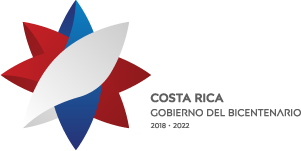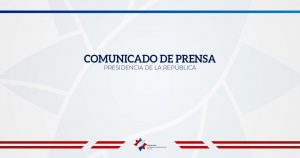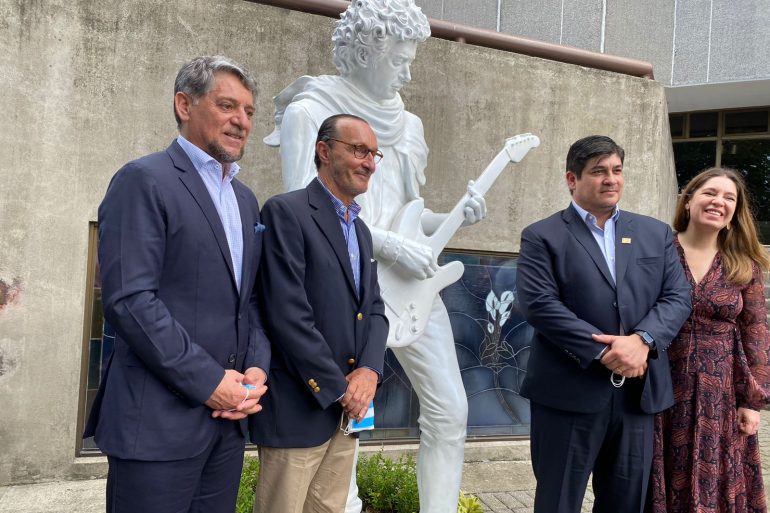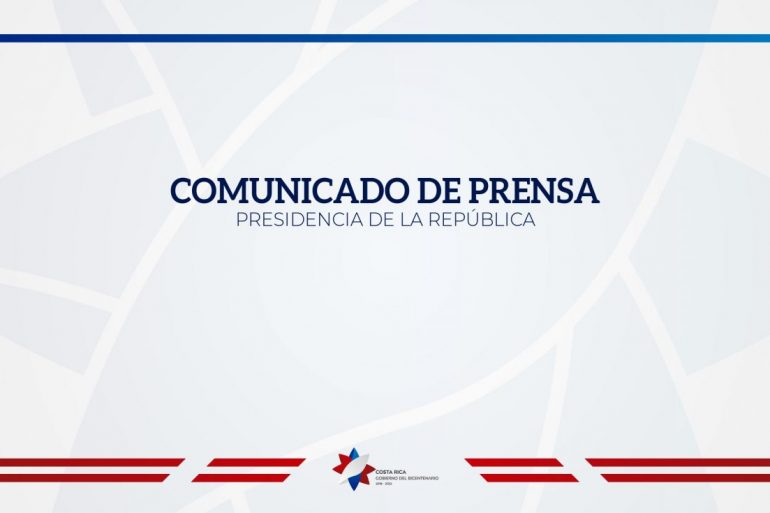New York, Estados Unidos. 26 de setiembre de 2015. El proceso de elección de quien ocupe la Secretaría General de la Organización de Naciones Unidas debe cambiar y estar fundamentado en los principios de democracia, transparencia, igualdad e independencia, que den garantía de la escogencia de figuras preponderantes en el plano mundial.
Este fue el mensaje central del Presidente de la República, Luis Guillermo Solís Rivera, quien auspició junto a otros líderes mundiales, en un evento especial de Alto Nivel sobre la selección del próximo Secretario (a) General de la ONU, convocado por Costa Rica, Estonia y Finlandia en nombre del Grupo para la Rendición de Cuentas, la Coherencia y la Transparencia (ACT por sus siglas en inglés), y The Elders, que es liderado por el exsecretario de las Naciones Unidas, Kofi Annan.
“Nos enorgullecemos del hecho de que Costa Rica presentó y defendió en el Grupo Especial de Trabajo sobre la Revitalización de la Asamblea General, la invitación a los Estados Miembros a presentar mujeres como candidatas para el puesto de la Secretaria General”, señaló el Mandatario al resaltar que Costa Rica ha forjado un camino hacia el cambio, sobre todo dentro de los métodos de trabajo del Consejo de Seguridad.
La discusión en torno a los cambios necesarios para asegurar la elección de la mejor persona que liderará al más importante órgano multilateral, ha aumentado de cara a la conclusión del mandato del actual Secretario General, Ban ki-Moon, quien dejará su cargo a partir del 31 de diciembre de 2016. Lo anterior se debe a que, desde su creación hace 70 años, la selección de quien ocupa la Secretaría General ha sido dominada por procedimientos contrarios a los que defiende la organización, razón por la cual “venimos de buena fe y con entusiasmo a tomar medidas para mejorar estos procesos y, que los mismos estén basados en los principios de equidad, transparencia, independencia y democracia”, enfatizó Solís Rivera.
Al ampliar sobre estos principios, el Mandatario ahondó en que la democracia es sinónimo de inclusión; la transparencia que conduzca un proceso de elección abierto; la igualdad que garantiza la no discriminación y la independencia que le permita a quien se designe desempeñar sus funciones con garantía de autoridad moral, integridad y coraje.
“Necesitamos un Secretario General fuerte, imparcial y sin compromisos. En este sentido, él o ella no debe preocuparse por favoritismos de campaña, reelección y promesas indebidas, sino centrarse en las actuales problemas globales, que claman por nuestra máxima atención”, concluyó el Presidente de la República de Costa Rica, Luis Guillermo Solís Rivera.
Más info: http://theelders.org/article/elders-new-york-building-stronger-un DESCARGAR DISCURSO: https://app.box.com/shared/static/ctpdfr5b5qktzcxooxso46n6dqj5m5jw.pdfStatement of H.E Luis Guillermo Solís-Rivera, President of Costa Rica
At the High Level Special Event on the Selection of the next Secretary General: Opening Up the Process.Excellencies, Distinguished delegates, Ladies and gentleman,
It is my great pleasure to be here today at this significant juncture, for we have all come together to discuss a burdening issue, that not only affects the delegates of the United Nations but also the seven billion people of the world.
That is the upcoming selection and appointment of the Secretary-General.
The Secretary General is the most important international figure of the world. The international community looks up to the person holding this Office for guidance, leadership and solutions to the world’s deepest and gravest crises -from climate change to terrorism, from nuclear disarmament to human rights issues, from women empowerment to conflict resolution and mediation.
However, since the inception of the United Nations, the process to select this crucial figure has been dominated by procedures contrary to those which this Organization upholds. Mainly transparency, equality, democracy and independence.
In matters pertaining the supreme leadership pf the United Nations, we cannot remain still, and we cannot continue to waiver.
We must refuse to accept the status quo.
The time has come for change. We hear the calls from Member States, civil society, and the unfortunate individuals most affected by the scourge of war. If we all want change, we must instill change.
2015 marks the seventieth anniversary of the United Nations as well as the year to congregate the selection process for the new Secretary General. We need to get the ball rolling in order to bring about the much-needed reform in the process for next year. I have faith that if we all work towards this goal, we can instill changes to select the best possible candidate.
I heartily welcome the reforms adopted in the area of Selection and Appointment of the Secretary General by the Ad-Hoc Working Group on the Revitalization of the General Assembly. But, they are not enough. Resolution affirming the readiness to continue discussing all the issues relating to the selection and appointment of the Secretary-General in all their aspects has been accepted. We have been in the discussion mode since 1945; especially when it comes to the term, selection and appointment of the Secretary General and I wonder how many years will it take to bring about concrete transformations. The transformation the United Nations urgently requires.
For many years, Costa Rica has been forging a path towards change, especially within the working methods of the Security Council. We have done so guided by four basic principles: democracy, transparency, equality and independence. I have come here today to discuss these four basic principles and why they stand to be vital to the process of the election of the Secretary General.
Costa Rica believes that democracy is synonymous with inclusivity. All Member States represented in the General Assembly and not just the 15 members of the Security Council should be involved in this selection process. We need the General Assembly to take a more active and robust role. We continue to stand firm on our demand that the Security Council submit a list of two or more candidates to the General Assembly, in order for us to vote and to have a Secretary General chosen in a truly democratic manner.
Not only do we deserve a voice in the process but we also deserve sight into the process, which takes me to the principle of transparency. An open, transparent, merit based election process with a sense of predictability, conducted in a timely and structured manner is the need of the hour.
In this regard, I welcome the adoption of the Ad-Hoc Working Group’s proposal to request the Presidents of the General Assembly and the Security Council to jointly circulate to all Member States, on an ongoing basis the names of individuals that have been submitted for consideration as candidates for the position of the Secretary-General with accompanying documents, including curricula vitae. I also highly appreciate the Committee’s proposal that the General Assembly conduct hearings or meetings with candidates running for the post of Secretary-General.
This brings me to my next principle –equality, which should be fulfilled this time around. The time has come to select a female Secretary General. As we all know, the past eight Secretary Generals have all been men, and even though this is merely a fact, should qualifications among candidates be equal, we should choose a woman. This is not to discriminate, but rather to uphold the principle of equality and empower the women of today and tomorrow. We take pride in the fact that Costa Rica presented and defended within the Ad-Hoc Working Committee the invitation to Member States to consider presenting women as candidates for the position of the Secretary-General. And that our proposal is now reflected on the text.
The fourth and the last principle that should guide our efforts should be the principle of independence. In order for the United Nations to do its job more effectively, we need our Secretary General to discharge her duties with moral authority, integrity and courage. We need a Secretary General who is strong, unbiased, and uncompromised. In this sense, he or she shouldn’t be concerned with campaigning, re-election favoritisms and undue promises, but instead should be focused on the present global concerns, which cry for our utmost attention.
In order to engender greater focus and independence within the post, we suggest that the term of office be changed to a single, non-renewable term of seven years. The precedents for the idea have existed since the inception of the United Nations in 1945. We must remember that whomever we select, should be a highly qualified, a visionary leader as he or she will be held accountable to do their job well by all. It should be a matter of highest priority for us that the term of the Secretary General be revised before the election in 2016. Else, we will find ourselves stuck in a limbo involving discussions and deliberations as we have been for the past 70 years.
Ladies and gentlemen,
Let us all, therefore, come together in good faith and with enthusiasm to take action for the betterment of all so as to instill the four principles of democracy, transparency, equality, and independence into the process of the selection and appointment of the next Secretary General.
The times is right. The time is now. I thank you very much.
]]>



